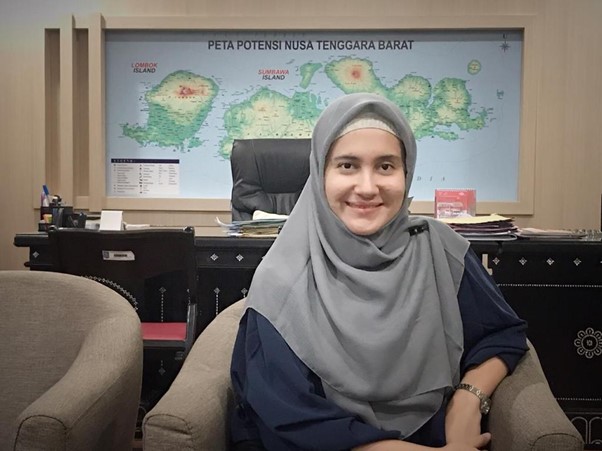Founder and CEO, Green Network Asia
Publishing
As a public policy student at LKYSPP, Marlis Afridah’s turning point occurred inside and outside the classroom. In Singapore, on an OCBC scholarship, she soon became exposed to a slew of viewpoints in public policy.
Marlis says, “At LKYSPP, I learnt to look at issues from multi-stakeholder perspectives, those from governments, businesses and civil society. I also learnt to understand multi-disciplinary approaches, including economics, politics & international relations, and public management, and avoid siloed perspectives. That’s indeed facilitated by the school’s interdisciplinary curriculum, which my professors find central to public policy education.”

Marlis Afridah at the Office of Regional Development Planning Agency, West Nusa Tenggara province, Indonesia.
Her learning experience at LKYSPP has served her well while setting up her company that delivers sustainable development and public affairs consultancy, Green Network Asia, in Jakarta in May 2021.
With Green Network Asia, Marlis advocates businesses to implement responsible and sustainable business practices. She attributes her expertise in the field to her professional experience in policy research, government affairs and public affairs that she learnt first-hand from the late Dr Roger Hayes, senior counsellor at APCO Worldwide, who at the time was a visiting professor at LKYSPP.
Marlis adds, “We also do public education for organisations and individual citizens and customers through our digital integrated platforms to share knowledge, improve awareness and create potential collaborations to solve problems in society.”
The consultancy partners with governments, businesses and civil society organisations while collaborating with stakeholders in the community “to serve people, the planet, the organisation and partners”, she says.
Change can only happen when this knowledge of sustainability principles becomes mainstream. When customers become more mindful, they can become a big force in asking businesses to transform. In their capacity as citizens, they would be able to urge governments to create good and effective policies.
For example, Marlis wants more people to rethink the super cheap products we are familiar with, such as clothing: behind the allure of spending less, most likely there is labour exploitation, environmental degradation and other issues.
She explains, “It isn’t easy to shift the paradigm, but we are determined to advocate. Change can only happen when this knowledge of sustainability principles becomes mainstream. When customers become more mindful, they can become a big force in asking businesses to transform. In their capacity as citizens, they would be able to urge governments to create good and effective policies.”
For Marlis, another big benefit of studying at LKYSPP was the networking beyond the classroom. The LKYSPP community, from classmates to professors to staff, has become a powerful alliance that helps each other in times of need and provides longer-term learning and development opportunities beyond the school.
She says, "Until now, I don’t think I have maximised this network resource. There’s still so much untapped potential we can develop from being a part of the LKYSPP community."